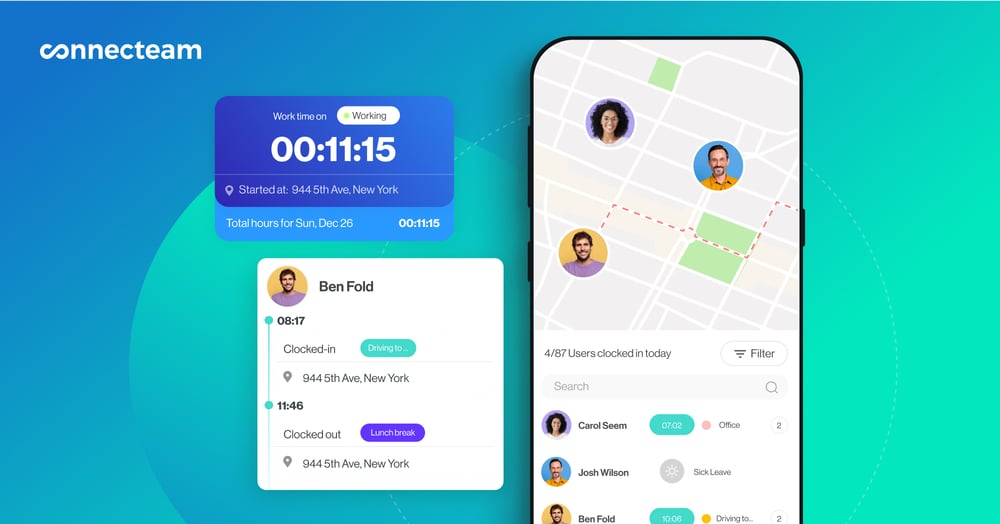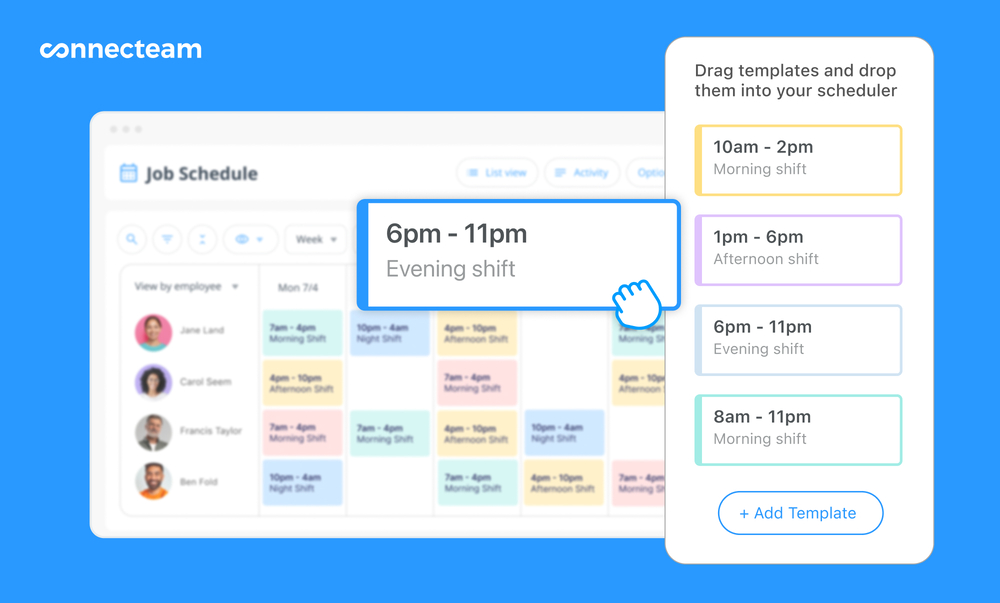Starting a security company takes more than just hiring a few guards and handing out uniforms. From legal setup to marketing, there are steps you should follow to launch a successful business.
The need for security guards isn’t going anywhere. As long as businesses face risks and want to protect their people and their assets, there will be demand for professionals to keep things under control.
Starting a security company can be a smart decision, if you do it right. It requires planning, licensing, funding, and a whole lot of hard work.
This guide walks you through every step you need to build a trusted security company your clients can rely on.
Key Takeaways:
- Investing in the right tools early on will save you time, reduce errors, and help you scale your business.
- Choose a specific security niche to focus your services, marketing, and startup costs.
- Get the proper licenses, insurance, and legal setup before launching.
- Hire your team carefully, train consistently, and standardize processes so every guard can represent your company well.
Why You Should Start a Security Company
Security is a steady, in-demand industry with lots of specialities. Starting a security company might mean offering a range of services, including:
- Personal protection (armed or unarmed)
- CCTV monitoring and surveillance
- Private investigations
- Transporting cash and valuables
- Event and venue security
- Door supervision and access control
What’s great about the industry is that you can focus on one niche or offer a full suite of services, depending on the direction you want to go.
In the United States, the market is thriving, with an estimated revenue of $46 billion dollars in 2025 alone. There are over 1.2 million security guards employed in America, and that number is expected to grow.
If you’re looking to start a business that’s scalable and essential across industries, security is worth considering.
How Much Does it Cost to Start a Security Guard Company?
Startup costs for a security guard company really depend on your location, services, and whether you’re operating independently or hiring a full team. Here’s a detailed breakdown of the main expenses you can expect:
Licensing and registration ($400–$2,700+)
Each state has its own requirements and fees when it comes to licensing for security companies.
- Business registration: $50–$500
- Private patrol operator license: $300–$1,500+
- Guard card: $50–$200 per guard
- Firearm permit (if relevant): $100–$500 per guard
In some states, like New York and Texas, additional training and background checks are required, which can increase costs.
Insurance premiums ($3,100–$9,300+)
Insurance is essential for any business, but it’s often required for security companies in order to operate. If you plan on offering armed services, you’ll likely need higher premiums.
- General liability: $2,000–$6,000/year
- Workers’ comp: $1,000–$3,000+
- Bond insurance: $100–$300/year
Equipment and uniforms ($250–$41,000+)
Your guards need the proper gear to look professional and do their jobs effectively.
- Uniforms: $100–$300 per guard
- Communication devices: $50–$300 each
- Flashlights, batons, handcuffs, etc.: $100–$500 per guard
- Firearms (if relevant):
- New: $500–$1,200 each
- Used: $300–$700 each
- Firearm accessories, safes, and licenses: $100–$500+ per firearm
- Patrol vehicles (if relevant):
- Used security vehicle: $5,000–$15,000
- New patrol SUV or car: $20,000–$35,000+
- Vehicle wrap/branding: $500–$2,500
- Ongoing fuel, maintenance, insurance: $300–$700/month per vehicle
Office space ($600–$2,000+)
It’s not always necessary when you’re just starting out, but a physical address can help with licensing and boosting your legitimacy.
- Coworking spaces: $100–$500/month
- Small private offices: $500–$1,500/month
Marketing and branding ($450–$6,000+)
To be successful, your business needs to attract potential clients. Your marketing needs depend on how competitive your local market is.
- Logo and brand design: $50–$500
- Website:
- DIY: ~$100/year
- Professionally built: $500–$2,500+
- Business cards, flyers, signage: $100–$1,000+
- Online ads, local listings, SEO: $200–$2,000+/month
Security management software ($0–$99+)
Security management software can help simplify your operations. Some tools, like Connecteam, offer scheduling, GPS tracking, and training all in one platform.
Connecteam’s Small Business Plan is free for up to 10 users, and paid plans range from $29–$99/month for up to 30 users.
Read our breakdown of the 5 Best Security Software in 2025.
Total estimated startup cost ($5,000–$75,000+)
All in all, your total startup costs really depend on what services you plan to offer.
- Low-end (unarmed, solo operator, remote office): $5,000–$10,000
- Mid-range (small team, armed, basic office): $15,000–$30,000
- High-end (multi-guard operation, full gear, patrol vehicles): $40,000–$75,000+
The Step-by-Step Guide to Starting a Security Company
Now that we’ve covered why to start a security company and the costs involved, here’s our step by step guide:
Define your services and niche
Before you do anything else, choose what type of security services you want to offer. Since the industry is broad, focus on one specific area, instead of trying to cover everything from day one.
Identify a niche that matches your experience, budget, and local demand. Some common options include:
- Mobile patrols
- Stationary (on-site) guard services
- Personal protection/bodyguarding
- Residential or business alarm monitoring
- Cybersecurity and IT risk services
- Crisis response or emergency coverage
By focusing on one or two core services, you can price more accurately, hire the right team, and market your business more efficiently.
Pro Tip
Pay attention to what’s missing in your area. Are local stores dealing with shoplifting? Do apartment complexes lack visible security? Find the gaps and position your service as the solution.
Action Items:
- Choose a niche service or two to specialize in.
- Research your local area for security needs or underserved markets.
Create a business plan
Your business plan is the map for how your security company will start, operate, and grow. It lays out your services, target market, pricing strategy, financial goals, and how you’ll stand out from competitors.
If you plan to seek outside funding from a bank or investor, a detailed, traditional business plan with projected income, startup costs, and market analysis is a must. If you go the self-funded route, a simple one-page plan can still keep you focused.
Your plan should include:
- Executive summary
- Company description
- Description of services
- Thorough market analysis
- Sales and marketing strategy
- Startup costs and financial forecasts
- Pricing and competitive advantage
- Operations and staffing plan
Pro Tip
Check out our complete guide on How to Write a Business Plan. It covers everything you need to get organized from day one.
Action Items:
- Draft your business plan or fill in a template
- Review sample plans for structure and detail
Choose your business name and structure
Before legally operating your security guard company, you need to establish a legal entity and choose a name that demonstrates trust and professionalism. Start by picking your legal structure:
- LLC (Limited Liability Company): Offers legal protection and flexibility
- Corporation: Best for scaling or attracting investors
- DBA (Doing Business As): Best for sole proprietors operating under a brand name
Next, choose your business name. Try to avoid personal names like “Joe’s Security”, which can seem unprofessional. Instead, go for names that emphasize reliability or expertise.
Action Items:
- Research the best business structure for your situation
- Brainstorm a strong, professional business name
- Check that your name is available with USPTO
Register your business and get an EIN
Before you can open your security guard company, you’ll need to register for applicable state and federal taxes. The first step is to apply for an Employer Identification Number (EIN), which is a simple, free process through the IRS.
Pro Tip
If you’re not sure about your tax obligations (such as handling 1099 contractors vs. W-2 employees), consult a qualified accountant or attorney. Tax mistakes can be time-consuming and costly to fix, so it’s worth getting expert guidance upfront.
Action Items:
- Apply for your EIN through the IRS website
- Speak with a tax professional to confirm your federal and state tax responsibilities
Get licensed and stay compliant
Security is a regulated industry, so operating without the proper licenses can close your business before you even get started. Licensing requirements vary by state, so it’s important to know exactly what you need where you plan to operate.
Here are some of the common licenses your business might need:
Security Guard License
This certifies that you, or your staff, have the necessary skills to perform security duties. Requirements vary, but this usually includes background checks and training in areas like powers of arrest, public safety, and use of force.
In California, for example, guards must complete 40 hours of approved training and pay a $55 application fee.
Private Patrol Operator (PPO) License
This license is for owners of security businesses. Most states require prior supervisory experience in the field, typically 3-4 years.
Michigan requires applicants to be 21+, have a clean criminal record, hold a high school diploma or equivalent, and show four years of supervisory experience.
Qualified Manager License
If your company offers multiple services (e.g., guard, alarm, armored car), many states require a qualified security manager with verified experience in each area.
In Texas, the qualified manager must have two consecutive years of experience in every service your company offers. The license starts at $412.
Other possible requirements:
- Background checks
- Fingerprinting
- Proof of insurance or bonding
- State or local business permits
Visit your state’s licensing board or department of public safety for exact requirements.
Pro Tip
Gather all your required documents ahead of time: proof of experience, training certifications, IDs, and application fees. Missing paperwork can delay approval by weeks or even months.
Action Items:
- Research your state’s licensing requirements for security companies
- Confirm training and experience requirements
- Prepare all application documents and check fee schedules
- Bookmark your state’s licensing agency for future renewals and updates
Get insured and bonded
Insurance is a legal requirement in many states for security companies and a must-have for protecting your business, employees, and clients.
Here’s what you’ll need:
- General Liability Insurance: This covers bodily injury, property damage, or legal costs if something goes wrong on the job. It’s necessary for any guard service and usually required for licensing.
- Workers’ Compensation Insurance: This is required if you have employees. It covers medical expenses and lost wages if a guard gets injured while working.
- Bonding Insurance (Surety Bond): This reassures your clients that they’re financially protected if one of your employees steals or causes intentional harm. Most commercial contracts won’t hire you without it.
Action Items:
- Decide which insurance types apply to your services
- Get a few quotes from providers with experience in security business coverage
- If you’re unsure about policy limits or exclusions, speak with an insurance broker
Secure funding
If you can’t contribute 100% of the money when starting a security guard company, you should consider taking out a bank loan or obtaining credit. However, make sure you step into the bank well prepared. Bring all essential documents, such as registration with the authority, mission statement, business plan, and legal papers.
Starting a security company isn’t cheap. You might need to hire staff, purchase vehicles, invest in gear, or rent an office space. If you don’t have the full amount in your personal savings, there are several ways to secure startup funding:
- Small Business Loans: Offered by banks, credit unions, and the SBA. You’ll need to prepare a business plan, budget, and documents.
- Grants: Female, minority, or veteran entrepreneurs may qualify for government or private grants. These don’t need to be repaid but are usually competitive.
- Investors: Angel investors or business partners may be interested if your plan shows long-term profitability.
- Lines of Credit: If you need short-term cash flow once you’re up and running, this is a good option.
Pro Tip
Meet with a financial advisor before applying for a loan or pitching to investors. Many offer a free consultation and can help you avoid common mistakes.
Action Items:
- Calculate your startup costs and identify funding gaps
- Research relevant loans, grants, or investment opportunities
- Prepare all required documents: registration, licenses, business plan, and financial projections
Purchase equipment
The equipment you need depends on what services you offer. Regardless if you’re providing unarmed guard services or armed mobile patrols, investing in the right gear from day one is essential for safety, professionalism, and compliance.
Here’s what you’ll probably need:
- Uniforms & Apparel: High-visibility jackets, durable pants, and steel-toe boots are standard. Consider bulletproof vests for high-risk posts.
- Flashlights & Lighting Gear: Essential for night shifts or poorly lit areas. It’s a good idea to invest in rechargeable, high-lumen flashlights.
- Defense Gear (where legal): Depending on your state laws and license type, this may include pepper spray, batons, tasers, or firearms. Always ensure compliance with local regulations and proper training.
- Communication Tools: Two-way radios are common for field teams, but you might choose to use a mobile security app like Connecteam, which provides secure, trackable team messaging in real time.
- Vehicles (for patrol services): Branded patrol vehicles can boost visibility and client trust. SUVs are common for their affordability and durability.
Pro Tip
Match your equipment to your services. Don’t waste money on defense gear or tech you’re not legally authorized (or required) to use.
Action Items:
- List out the gear you actually need for your services
- Research second-hand or government surplus vendors to save costs
- Inspect all equipment before purchase to ensure it’s fully functional
Build your brand
First impressions matter in the security industry, where trust, professionalism, and authority are essential. Your brand is your identity that helps potential clients feel confident hiring you. Here’s where to start:
Design your logo
Your logo should communicate what your company does and convey professionalism. Avoid overly complex designs or flashy fonts. A clean, scalable logo with simple elements works best across uniforms, patrol vehicles, business cards, and digital platforms.
Build a website
A business website is often the first place potential clients go to check your credibility. Keep your website clean, fast-loading, and easy to navigate. Include elements like:
- Services offered
- Service areas
- Contact info
- Customer testimonials
- Badges or licenses
Use website builders like Wix or Squarespace for quick and affordable setup. You can also hire a website developer if you’re looking for less work and willing to spend a bit more money.
Action Items:
- Research logos from top security companies
- Design a logo or hire a freelance graphic designer
- Choose a web builder or hire a freelancer
Develop a marketing strategy
You need a marketing strategy in order to attract clients. Marketing a security company centers on building trust and visibility in your local market. Your strategy should focus on credibility, consistency, and clear messaging.
Here are a few effective marketing strategies to try:
- Google Business Profile: Claim and optimize your Google Business listing. Add photos, your services, business hours, and collect reviews from clients. Local search is the fastest way for people to find you in your area.
- Local Networking: Start building relationships with property managers, event planners, retail store owners, and local business groups. In high-trust industries like security, word of mouth can go a long way.
- Social Media: Use Facebook, LinkedIn, and Instagram to showcase your team, post updates, share safety tips, and highlight successful jobs (with client consent). Having a social media presence helps build brand recognition and gives potential and existing clients a way to interact with you.
- Paid Advertising: If it fits within your budget, run targeted ads on Google or Facebook to reach local business owners seeking security services. Or, go the more traditional route by taking out ads in local newspapers, billboards, or radio spots.
- Sales Strategy: Identify your ideal clients and reach out to them directly. Cold calls, follow-up emails, and in-person visits can still win contracts, especially if you have a competitive proposal.
Pro Tip
Marketing is a long game, so start small but stay consistent. Track what works, double down, and adjust as your business grows.
Action Items:
- Claim your Google Business Profile and ask for reviews
- Attend local business networking events
- Set a posting schedule for social media
- Test a small paid ad campaign and track results
Pricing and revenue projections
To run a successful security company, you need a business model that’s sustainable and profitable. Start by reviewing your service types, pricing them competitively, and considering your projected revenue.
Services and revenue models
Most security companies bring in revenue through hourly contracts or fixed-fee service packages. Here are a few common service types:
| Service Type | Use Case | Type of Rate | Typical Rate ($)* |
| Unarmed guard services | Retail, offices, reception | Hourly | $20-$35/hour |
| Armed guard services | Banks, dispensaries, sensitive areas | Hourly | $35-$60/hour |
| Mobile patrol services | Parking lots, gated communities | Per route or shift | $30-$70/hour |
| Event security | Concerts, festivals | Flat-rate or per guard per hour | $25-$50/hour |
| Personal protection and bodyguarding | High-profile clients | Custom | $60-$100+/hour |
| CCTV monitoring and surveillance | Remote | Subscription or hourly | $500-$1,500/month per site |
*Note: This is the rate companies charge their clients, not a guard’s pay rate.
Pricing competitively
To keep up with the competition while remaining profitable, make sure to:
- Know your costs: Wages, insurance, equipment, admin time, and travel.
- Research local market rates: Check what others in your area charge for their services.
- Don’t underprice: Low rates may attract clients, but they can damage your margins in the long run.
- Offer packages: Bundle your services to maximize revenue per client. Package services like patrol and surveillance together for maximum value.
Financial projections
As you figure out your pricing and service models, it’s a good idea to create 12–24 month projections, including:
- Estimated number of clients or contracts
- Average billing per client
- Operating costs (payroll, insurance, gear, etc.)
- Profit margins (aim for 10–20% after expenses)
Action Items:
- Create a list of your services and pricing (per hour or per project)
- Estimate monthly and yearly revenue based on client volume
- Adjust pricing as needed based on demand
Hire and train your team
Before you can open your doors, you’ll need to recruit and train your team. Your guards are the face of your business, and they’ll be interacting with clients from day one. That’s why hiring the right people and giving them proper training is essential to your success.
Here are a few steps to build a top team:
- Recruit qualified candidates: Start by looking for licensed, experienced guards. This is especially important if you’re offering armed services. Check job boards, security-specific hiring platforms, or referrals from people you trust.
- Run background checks: This might already be part of licensing, but you should verify criminal history, work eligibility, and employment history. Most clients will expect proof that your guards are vetted.
- Verify all certifications: Ensure every guard holds the required licenses, firearm permits (if relevant), and any mandatory state training. Keep documentation organized for audits and client reviews, and make sure to stay on top of renewals.
- Provide onboarding and training: Even licensed guards need to be trained in your security company’s procedures. Consider including topics like:
- Customer service
- Incident reporting
- Use-of-force policy
- De-escalation techniques
- Post orders
- Shift protocols
Action Items:
- Post job ads and screen applicants carefully
- Conduct background checks and license verifications
- Use document management software to stay organized
Set up payroll and scheduling
There’s a lot of admin work that goes into managing a team of guards. You’re handling complex schedules, shift changes, overtime, payroll, and more. Instead of doing it all manually and risking errors and headaches, you can use digital tools to:
- Create and share schedules in minutes
- Track hours with GPS time clocks
- Monitor attendance, breaks, and shift swaps
- Export accurate payroll data to your provider
Action Items:
- Research and choose a payroll provider
- Set up an online scheduling system
- Integrate time tracking with payroll
Connecteam is the All-in-One Security Guard Management App
Connecteam is the all-in-one employee management app trusted by security professionals to run their businesses. It replaces paperwork and outdated processes with mobile-first tools easy enough for everyone to use.

GPS time tracking
Knowing your guards’ exact location when they’re on the job is critical. Connecteam’s employee time clock comes with a real time GPS tracker so you know where and when your guards clock in and out. It prevents time theft and buddy punching, and promotes accountability, while supporting accurate client billing and protecting your bottom line.
Smarter scheduling
Create and manage employee scheduling in just a few clicks. Use the AI-powered auto-scheduler to generate full shift schedules based on availability, skills, and needs. Guards can access their schedule directly from their phones.

Team communication
Use the online team chat to reach your team instantly. Update post instructions, issue alerts, or remind guards about upcoming shift protocols. Connecteam keeps communication secured and teams aligned, without relying on personal messaging apps.
Document management
Connecteam keeps all your team documents organized, accessible, and secure. Store all your licenses, certifications, and permits in one central place, and add expiration dates so you know when to renew.
Training and onboarding
Connecteam’s AI Course Creator lets you build custom training and onboarding in seconds. Describe your topic, and the platform instantly generates a complete training course. Guards can access training on their mobile devices, and you can track their progress.
Connecteam’s Small Business Plan is completely free for up to 10 users, and paid plans start at just $29/month for up to 30 users.
Try Connecteam for free today!
The #1 App for Security Businesses
Easily build schedules, track employee hours, and instantly communicate with your entire workforce with Connecteam.
The Bottom Line
Starting a security company involves planning, picking a niche, developing a strong brand, hiring the best team, and using the right tools. Use this guide to help build a solid foundation for your business.
There’s a lot of responsibility when it comes to running a security company. Clients trust you to protect their people, property, and peace of mind. That trust starts with how you manage your team.
Make running your business a breeze with an all-in-one software like Connecteam, which handles scheduling, time tracking, communication, and compliance. That way, you launch your company the right way from day one.
FAQs
Can I start a security company with limited capital?
Yes, but start small. Focus on a specific service, work from a home office, lease equipment if possible, and obtain essential licenses and insurance to keep your startup cost low.
How do I comply with data privacy regulations for security camera footage?
Store footage securely, restrict access, and keep data for only as long as necessary. Always inform your clients and staff about surveillance policies.
What are the key performance indicators (KPIs) for a security guard company?
Track client retention, incident response times, guard attendance, overtime costs, and shift coverage. Use Connecteam to monitor schedules and guard performance.
What are the best strategies for scaling a security guard company while maintaining quality service?
Standardize training, automate scheduling, and use guard management software like Connecteam to keep operations consistent as your team grows.




